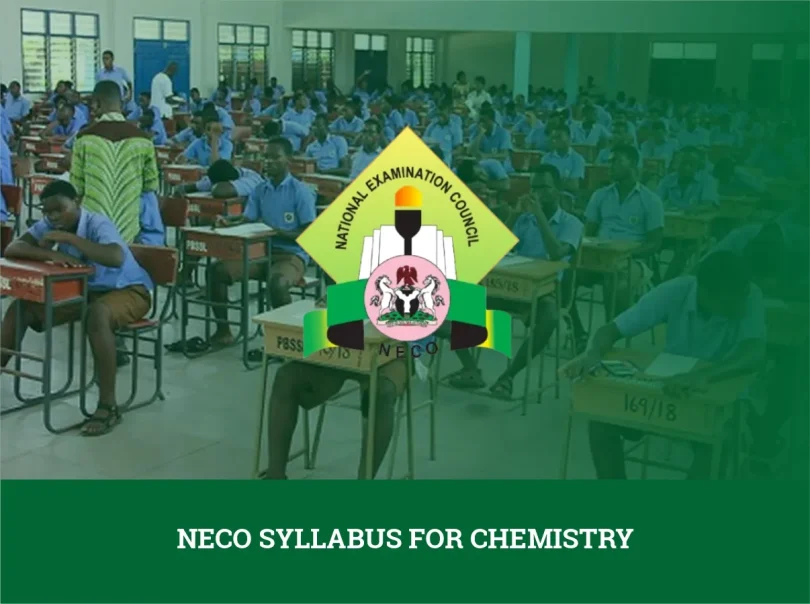The NECO Syllabus for Chemistry is now available! NECO plays a major role in getting into universities, polytechnics, or colleges of education in Nigeria. The National Examinations Council (NECO) is a Nigerian examination body that conducts the Senior School Certificate Examination (SSCE), and it is one of the most important exams for students in senior secondary school (SS1–SS3). This subject explains what substances are made of, how they interact, and how chemical processes affect our lives.
The chemistry subject can seem difficult or overwhelming to many students; that is why NECO always provides a syllabus to guide you through. The syllabus is like a map that outlines the topics to study, how to prepare for the NECO chemistry exam, and what the exam will test. The information provided in this article will help you understand the syllabus, know how the marks are awarded, and make your study more effective and focused to pass the exam.
Objectives of the NECO Chemistry Exam
The NECO Chemistry exam is designed to test what you have learned during your time in school. The exam wants to find out the following:
- Students should be able to explain important ideas like atomic structure, bonding, acids and bases, etc.
- You must use chemistry principles to solve real-life problems, like why iron rusts or how soap is made.
- You should observe and describe chemical reactions correctly, whether in practicals or theory.
- You need to be able to carry out experiments, take measurements, and write accurate reports.
- You should be able to solve numerical problems, such as calculating molar mass, concentration, or energy changes.
- You are expected to think logically and carefully, just like a scientist, using facts and evidence.
Marking Guide for the NECO Chemistry Exam
The NECO Chemistry exam usually comes in three papers, and each one tests different skills:
Paper I: Objective (Multiple Choice) – 50 marks
- Contains 50 multiple-choice questions.
- You will pick the correct option (A, B, C, or D).
- Each question carries 1 mark.
- Topics cover the entire syllabus.
Paper II: Theory (Essay) – 80 marks
- Contains long-answer questions based on major topics like chemical bonding, equations, acids and bases, etc.
- Usually, 5 to 6 questions are to be answered out of a given number (e.g., choose 5 out of 7).
- Each question may have sub-parts and can carry between 10 to 20 marks.
Paper III: Practical – 50 marks
- Test your hands-on skills in the lab.
- You will be asked to carry out experiments, record observations, do calculations, and write short reports.
- You may be given questions on:
- Titration (Acid-Base)
- Qualitative analysis (Testing unknown substances)
- Simple experiment setups
Details of the NECO Syllabus for Chemistry
1. Introduction to Chemistry
- Understand how to measure things in chemistry (like mass, volume, and temperature).
- Learn how scientists solve problems using experiments (scientific methods).
2. Structure of the Atom
- Know the parts of an atom: protons, neutrons, and electrons.
- Understand atomic number, mass number, and isotopes (same element, different neutrons).
- Learn how electrons are arranged in shells (electron configuration).
3. Periodic Table and Periodicity
- Learn how the periodic table was developed.
- Understand why elements are arranged the way they are.
- Study the patterns or trends (like atomic size, electronegativity, etc.).
4. Chemical Bonding
- Know how atoms bond (stick together) to form substances.
- Study ionic bonds (transfer of electrons) and covalent bonds (sharing electrons).
- Understand the properties of substances formed from these bonds.
5. Stoichiometry and Chemical Reactions
- Learn chemical symbols, formulas, and how to write equations.
- Practice balancing equations and calculating mass and the number of particles in reactions.
- Study the laws of chemical combination (e.g., conservation of mass).
6. States of Matter
- Learn the three main states: solid, liquid, and gas.
- Understand kinetic theory (how particles move).
- Study changes of state (melting, boiling) and diffusion.
7. Energy and Energy Changes
- Understand what energy is in a reaction (heat released or taken in).
- Learn about enthalpy changes (ΔH) and how they affect reactions.
8. Acids, Bases, and Salts
- Know what acids (e.g., HCl), bases (e.g., NaOH), and salts are.
- Study their properties and reactions.
- Understand the pH scale (acidic <7, neutral =7, basic >7).
9. Solubility of Substances
- Understand which substances dissolve and why.
- Learn about solubility curves and how to use them in real-life applications (e.g., making solutions).
10. Chemical Kinetics and Equilibrium
- Study how fast reactions happen (reaction rate).
- Learn what affects the speed: temperature, concentration, and catalysts.
- Understand chemical equilibrium and how reactions can reverse.
11. Redox Reactions
- Learn what oxidation and reduction mean (gain/lose electrons or oxygen).
- Identify oxidizing and reducing agents.
- Study electrochemical cells (e.g., batteries).
12. Chemistry of Carbon Compounds (Organic Chemistry)
- Learn how carbon compounds are classified (alkanes, alkenes, alcohols, etc.).
- Understand functional groups and how to name organic compounds.
- Study crude oil and how it is separated into useful products.
13. Chemistry, Industry, and the Environment
- Learn how chemistry is used in industries (soap making, plastics).
- Understand how chemicals can pollute air, water, and soil.
- Study how chemistry helps in biological processes (like digestion).
14. Basic Biochemistry and Synthetic Polymers
- Understand proteins and amino acids (building blocks of life).
- Learn what polymers are (plastics, rubber) and how they are made.
Recommended Textbooks
Use these to learn and practice:
- New School Chemistry – O. Y. Ababio
- Senior Secondary Chemistry (Books 1-3) – Bajah et al.
- Understanding Chemistry – G. O. Ojokuku
- Essential Chemistry – I. A. Odesina
- Countdown to Chemistry for NECO/WASSCE – Uche, Adenuga & Iwuagwu
Tips for Success
- Study early and regularly, don’t cram last minute.
- Practice calculations and chemical equations often.
- Use past questions and quizzes to test yourself.
- Understand concepts, not just memorize facts.
- Work in groups or with a tutor if needed.
The NECO Syllabus for Chemistry will serve as a study checklist for success. It will help you to focus on the topics that matter most, avoid wasting time on materials that don’t matter, and get ready for both theory and practical questions.
We believe this article has helped you to understand the key topics in the NECO Syllabus for chemistry, the objectives, and how the marks are shared. Follow the information provided in this article to boost your performance and keep visiting this page for more updates!







Leave a Comment